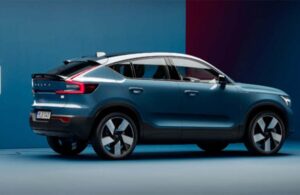Sweden based luxury car manufacturer, Volvo has revealed its plans to launch its second electric car in India in Q4CY23
 “We will launch the C40 Recharge electric car in the last quarter of this calendar year, and then a new electric car every year,” Nick Connor, Head of Volvo Cars in the Asia-Pacific, said. “Like the XC40 Recharge electric (launched last year), the C40 will also be assembled in India using completely knocked down kits, at our Bengaluru plant.”
“We will launch the C40 Recharge electric car in the last quarter of this calendar year, and then a new electric car every year,” Nick Connor, Head of Volvo Cars in the Asia-Pacific, said. “Like the XC40 Recharge electric (launched last year), the C40 will also be assembled in India using completely knocked down kits, at our Bengaluru plant.”
The C40 Recharge has a range of up to 500 km per charge, two battery pack options (69 kWh and 78 kWh), and can accelerate from 0-100 km/h in just 4.7 seconds.
The XC40 Recharge, priced at Rs 56.9 lakh (ex-showroom), has been selling above expectations, Jyoti Malhotra, managing director, Volvo Car India, commented.
While he didn’t share sales numbers, he said the XC40 Recharge has had a 17-18% sales share every month since deliveries started in November 2022.
Connor said that while Volvo has announced it will become an electric car-only company by 2030, the target could be achieved in some countries earlier than that. “In Australia, for example, we expect Volvo to go all-electric as early as 2026. In India as well, we strongly believe we will be in a position to sell only electric cars before 2030, and that’s why have promised to launch a new electric car every year,” he said.
On the overall premium car market, Malhotra said it will be able to beat the 2018 sales peak in 2023. “This year, we will also try to go past our peak sales of 2,638 cars that we recorded in 2018,” he said.
Volvo Car India sold 1,361 cars in 2020 and 1,724 units in 2021. While Malhotra didn’t share the exact sales number for 2022, he said growth was largely impacted by global headwinds, including the semiconductor shortage, geopolitical challenges and the shipping container shortage.
“There was ample customer demand, but we couldn’t supply as many cars in 2022. All our models have a 3-4 month waiting period. With almost everything coming back to normal now, this year we expect to reach our sales peak,” he said.

